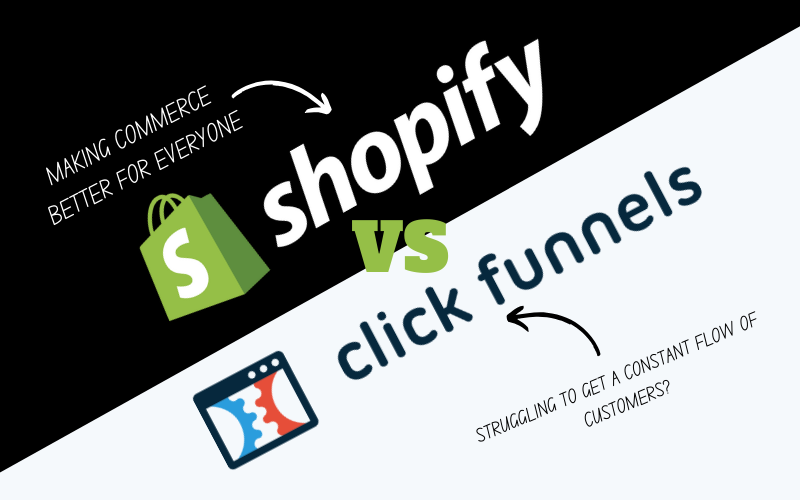ClickFunnels vs Shopify is a key decision point for businesses looking to build a strong online presence. Both platforms serve different purposes, with ClickFunnels focusing primarily on sales funnel optimization, while Shopify offers a comprehensive e-commerce platform that caters to businesses selling physical and digital products. Choosing between these two depends on your business needs, as they each offer distinct tools and features designed to grow your online business. Whether you’re focusing on streamlined sales funnels or building a full-scale online store, making the right choice will directly impact your business success.
Table of Contents
1. Overview: What Are ClickFunnels and Shopify?
Before making a decision, it’s essential to understand the core function of each platform in the ClickFunnels vs Shopify debate. ClickFunnels vs Shopify represents two distinct solutions for businesses: ClickFunnels specializes in building high-converting sales funnels, while Shopify is a comprehensive e-commerce platform designed to manage everything from product listings to payments and shipping.
ClickFunnels is primarily a sales funnel builder, designed to optimize the process of converting visitors into paying customers. With ClickFunnels, businesses can create landing pages, upsells, downsells, and entire sales funnels that guide leads through a structured path to increase conversion rates. It is an ideal platform for businesses focused on direct sales, digital products, or service offerings, providing tools to enhance the overall sales experience.
Shopify, by contrast, is a complete e-commerce platform that allows businesses to build fully operational online stores. Shopify supports selling physical or digital products, managing inventory, processing payments, and offering shipping solutions. It provides everything required for running a large or small-scale online store, with integrated tools for product listings and customer management.
Feature Line: When comparing ClickFunnels vs Shopify, the primary distinction is that ClickFunnels specializes in creating optimized sales funnels, while Shopify is a robust platform for e-commerce businesses aiming to build a fully functional online store.
2. Ease of Use
Selecting the right platform between ClickFunnels vs Shopify can greatly impact your business efficiency. Both platforms offer user-friendly interfaces, but their approaches cater to different types of users and goals. In the ClickFunnels vs Shopify comparison, ClickFunnels is optimized for creating sales funnels quickly and easily, helping users focus on lead generation and conversions. Meanwhile, Shopify is designed to manage comprehensive e-commerce operations, including inventory, payments, and product listings, providing a seamless experience for those running online stores.
- ClickFunnels: The platform is designed to help you quickly build sales funnels without needing technical skills. Its drag-and-drop editor allows users to create landing pages, upsell sequences, and checkout flows easily. This makes ClickFunnels an excellent choice for businesses focused on quickly launching funnels and converting leads. However, when it comes to managing a full e-commerce store with multiple products, ClickFunnels’ interface can feel a bit limited.
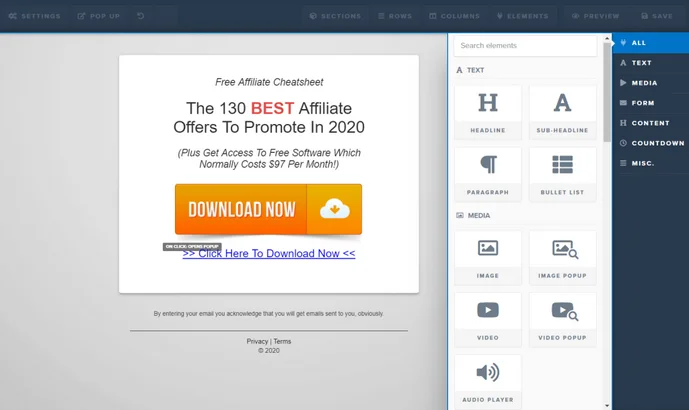
- Shopify: Shopify provides a streamlined user experience from start to finish. Setting up a store is simple, with clear steps guiding users through product listings, design customization, payment setup, and more. Shopify’s intuitive dashboard makes it easy for beginners to navigate, and it offers a step-by-step guide for setting up your store. Whether you’re managing a small or large store, Shopify’s interface is designed for scalability.

Feature Line: In the ClickFunnels vs Shopify comparison, Shopify offers a broader, more user-friendly experience for building and managing an entire online store.
3. Website Design and Templates
In the ClickFunnels vs Shopify comparison, the design options and templates available on each platform can greatly impact your business’s look and functionality. Let’s break down the key aspects:
- Template Variety
- ClickFunnels: Focused on funnel creation, ClickFunnels offers a limited number of pre-optimized sales funnel templates. These are designed to maximize conversion but lack variety for those looking to build a more diverse or visually unique store.

- Shopify: Shopify provides a wide array of both free and premium themes tailored to different industries. Whether your business is in fashion, electronics, or health, there’s a template to match your style and needs.
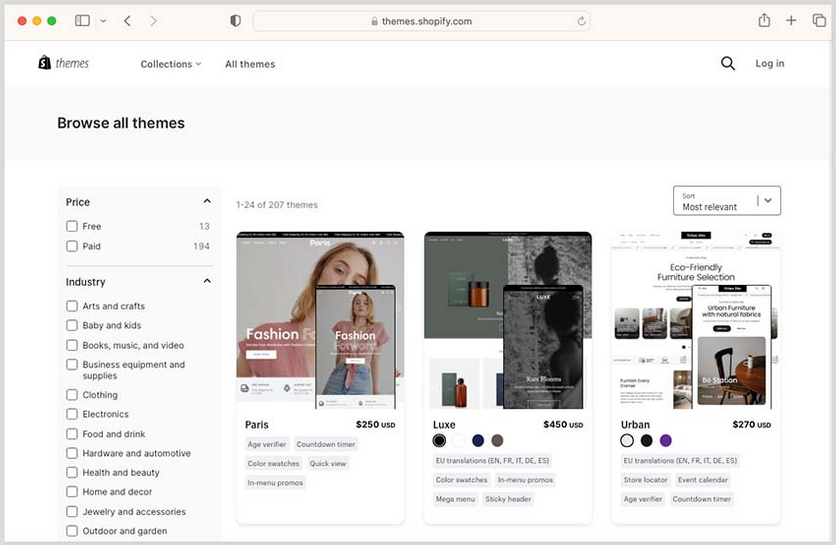
- Customization Options
- ClickFunnels: While ClickFunnels allows users to change basic elements like colors, text, and images, it doesn’t offer much flexibility beyond that. Customizing the layout or adding unique design elements can be difficult without coding skills.
- Shopify: Shopify shines when it comes to customization. Users can adjust fonts, layouts, colors, and even add custom code (HTML or CSS) for a more personalized design experience. This flexibility allows for a highly branded store that stands out.
- Mobile Optimization
- ClickFunnels: ClickFunnels templates are mobile-optimized, but sometimes require additional adjustments to ensure a seamless experience across all devices.
- Shopify: Shopify themes are fully mobile-responsive, automatically adapting to any device. This ensures that your store looks professional on both desktop and mobile without any extra work.
Key Takeaway: In the ClickFunnels vs Shopify design battle, Shopify stands out with a wider variety of templates, deeper customization, and excellent mobile responsiveness.
4. E-commerce Features
When comparing ClickFunnels vs Shopify in terms of e-commerce capabilities, each platform has distinct strengths. Let’s break down how their e-commerce features cater to different business needs.
- Built-in E-commerce Capabilities
- ClickFunnels: While ClickFunnels is primarily focused on building sales funnels, it does include some basic e-commerce functionality. You can create one-page checkouts, sell digital products, and set up upsell and downsell sequences. However, ClickFunnels is more limited when it comes to managing larger catalogs of products or handling complex store needs.
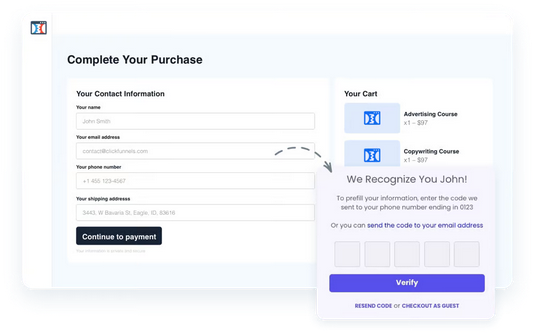
- Shopify: Shopify is a full-fledged e-commerce platform, designed to handle everything you need to run an online store. It supports product inventory management, multi-channel selling, order tracking, and much more. Whether you are selling a few items or managing a large store with thousands of products, Shopify’s built-in tools are designed to support your e-commerce business at any scale.
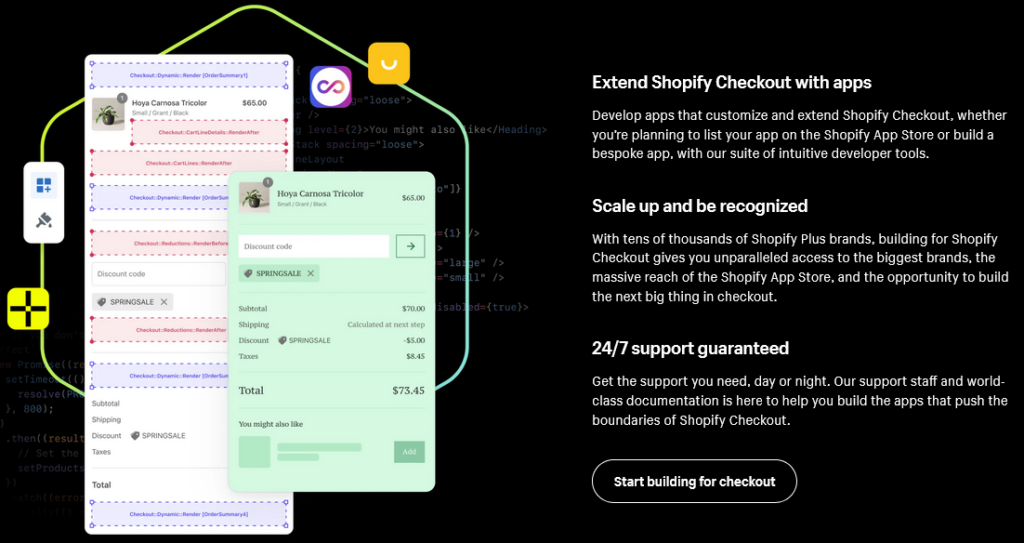
- Support for Online Stores and Product Listings
- ClickFunnels: Although ClickFunnels allows you to list and sell products through its funnel pages, it’s not designed to handle a traditional online store. The platform excels at single-product sales and quick funnels but doesn’t offer the same level of product management as Shopify.
- Shopify: Shopify is specifically built for online store management. It offers robust support for product listings, allowing you to organize your items into categories, manage stock levels, and showcase products with multiple images, variants, and descriptions. Shopify also provides integrations with payment gateways and shipping providers, ensuring that your store operates smoothly from the moment a customer places an order to the final delivery.
Key Takeaway: In the ClickFunnels vs Shopify comparison for e-commerce capabilities, Shopify offers a comprehensive solution for managing and growing online stores, with advanced product listing features and full support for larger inventories.
5. Sales Funnel Functionality
In the ClickFunnels vs Shopify debate, a key distinction between the platforms lies in their approach to sales funnels and conversion optimization. Here’s a breakdown of how each platform handles these critical aspects of online business:
- ClickFunnels’ Sales Funnel Stages
- ClickFunnels is built specifically to create high-converting sales funnels. It offers a structured, step-by-step process for leading potential customers from the initial visit to purchase. You can design funnels with landing pages, opt-in forms, one-click upsells, and thank-you pages. This guided approach maximizes conversions by helping visitors through the buying process. ClickFunnels also allows you to integrate payment gateways and automate follow-up emails, ensuring a seamless checkout experience.

- Shopify‘s Conversion Optimization Features
- While Shopify doesn’t focus solely on funnel building, it does provide features aimed at improving conversion rates. Shopify’s built-in tools like abandoned cart recovery, upsell apps, and discount codes help boost sales without needing complex funnels. Shopify’s app store also includes third-party apps that can add funnel functionality, enabling merchants to create their own conversion paths. The platform’s fast checkout, responsive design, and integrated apps contribute to overall sales growth.
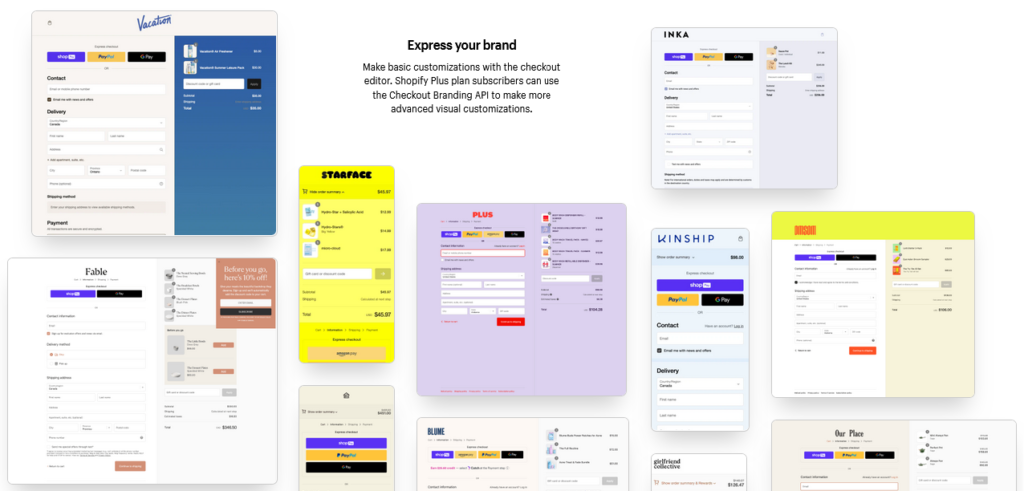
Key Takeaway: In the ClickFunnels vs Shopify comparison, ClickFunnels offers a more direct and detailed approach to sales funnels, while Shopify focuses on conversion optimization with a wide range of tools that can be enhanced through apps.
6. Marketing Tools
In the ClickFunnels vs Shopify comparison, marketing tools play a crucial role in helping businesses grow and attract customers. Both platforms offer integrated marketing features, but their focus and capabilities differ.
- Integrated Marketing Features
- ClickFunnels: ClickFunnels offers built-in marketing features like email automation, A/B testing, and lead generation tools. These tools are designed to help businesses nurture leads and optimize their sales funnels. While useful for funnel marketing, ClickFunnels’ SEO tools and social media integrations are limited compared to Shopify. Most advanced marketing efforts, especially for e-commerce stores, require third-party integrations.

- Shopify: Shopify comes with an extensive set of integrated marketing features. It provides SEO tools to optimize your store for search engines, including customizable meta tags and alt text for images. Shopify also offers built-in email marketing with Shopify Email, enabling you to create targeted campaigns directly from the platform. Additionally, Shopify supports social media integration, allowing you to sell directly on platforms like Facebook and Instagram, driving more traffic to your store.
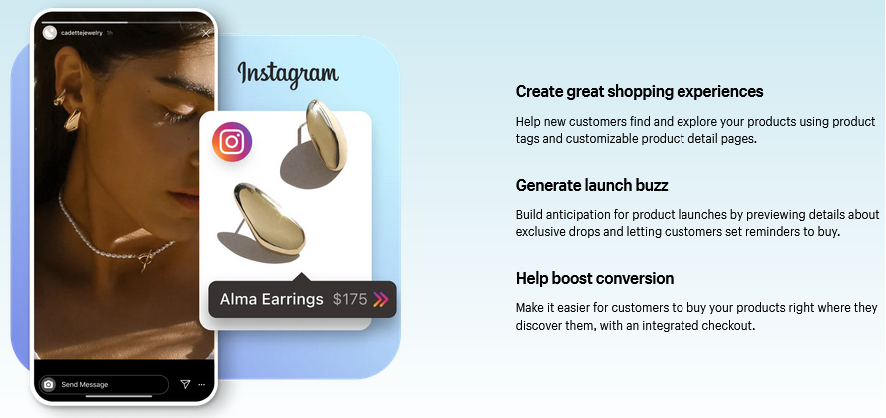
- Third-Party Marketing App Integrations
- ClickFunnels: ClickFunnels integrates with a variety of third-party marketing apps, such as Mailchimp, ActiveCampaign, and HubSpot. These integrations extend the platform’s marketing capabilities, but users need to rely heavily on external apps for more advanced features.
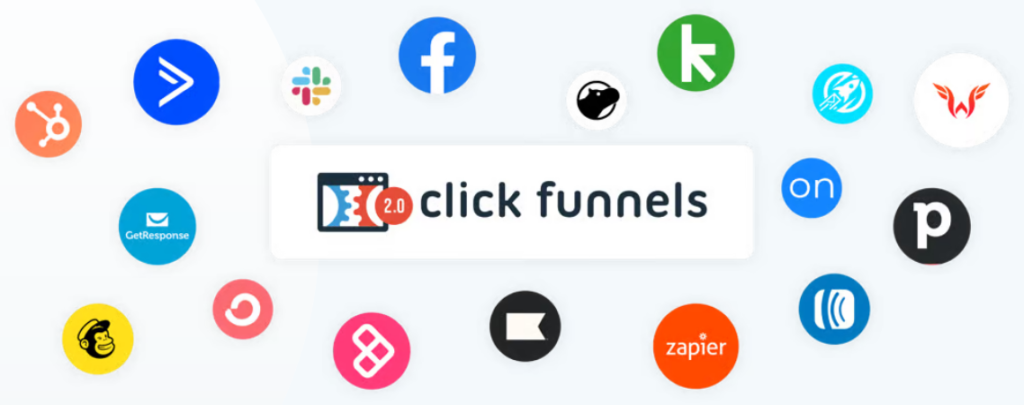
- Shopify: Shopify boasts a vast app marketplace with thousands of apps, including marketing solutions for email marketing, SEO, social media, and advertising. Popular apps like Klaviyo, Privy, and Google Analytics can be seamlessly integrated to enhance your marketing efforts. Shopify’s robust app ecosystem makes it easier to customize your store’s marketing strategy.

Key Takeaway: In the ClickFunnels vs Shopify marketing comparison, Shopify offers more comprehensive integrated marketing tools, especially for SEO and social media. Its wide range of third-party app integrations further enhances its marketing capabilities, giving businesses more control over their marketing strategies.
7. Pricing and Value for Money
When considering ClickFunnels vs Shopify, pricing and the value each platform offers are critical factors that can impact your decision. Both platforms have different pricing models suited to various business needs and budgets.
Detailed Breakdown of Pricing Tiers
- ClickFunnels starts at $97 per month for the Startup Plan, which includes essential tools for building and optimizing sales funnels, offering unlimited funnels, courses, members, contacts, pages, and domains, with 3 brand workspaces and 3 team members. For more advanced features, the Pro Plan is priced at $297 per month, which offers similar unlimited features but expands to 10 brand workspaces and 10 team members. While effective for funnel building, the pricing might feel steep for smaller businesses or those not needing the additional features right away.
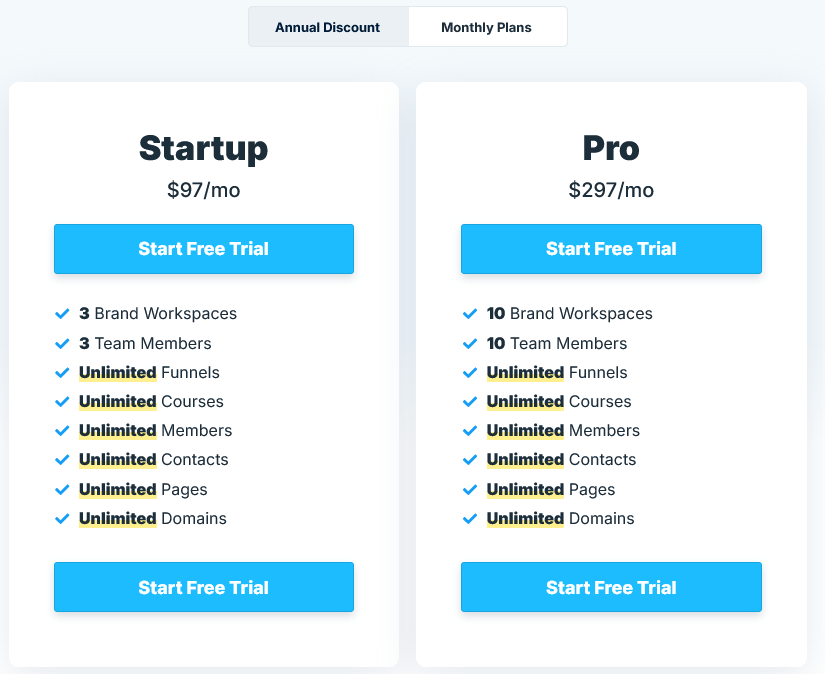
- Shopify: Shopify provides more flexible and affordable pricing. The Basic Shopify Plan costs $39 per month and covers everything you need to run a small online store. As your business grows, you can upgrade to the Shopify Plan for $105 per month or the Advanced Shopify Plan at $399 per month. For businesses looking to sell products online without a full store setup, Shopify also offers the Lite Plan for $9 per month.
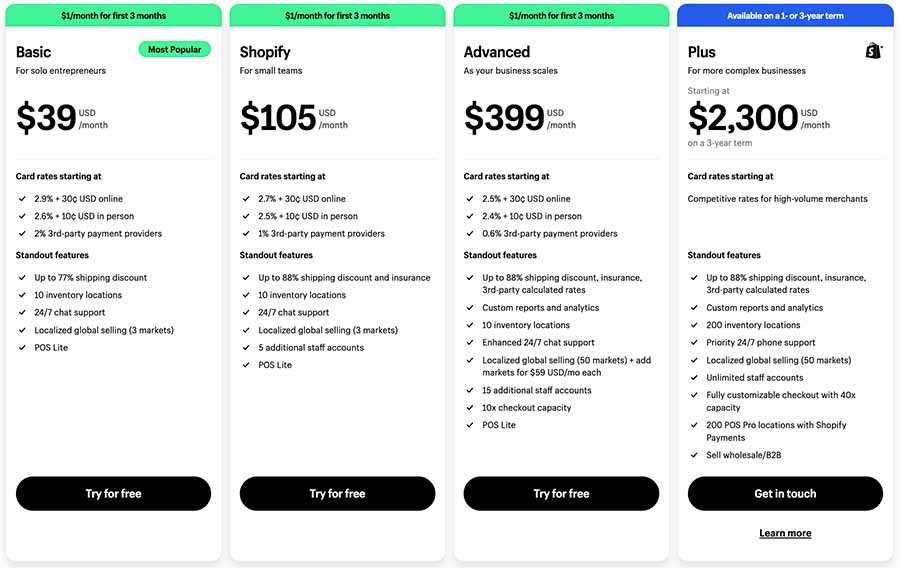
Comparison of What Each Tier Offers
- ClickFunnels: Higher-tier ClickFunnels plans include advanced features like A/B testing, affiliate management, and follow-up funnels. However, even with these added features, ClickFunnels remains focused on sales funnel creation and may not provide the full suite of e-commerce functionality that businesses seeking a comprehensive platform might require.
- Shopify: Shopify’s pricing tiers are designed to support e-commerce growth. Higher-tier plans come with benefits such as advanced reporting, custom shipping rates, and lower transaction fees, making it easier to scale as your business grows.
Key Takeaway: When comparing ClickFunnels vs Shopify, Shopify offers a more flexible and affordable pricing structure for most businesses, while ClickFunnels focuses on delivering specialized funnel-building tools at a higher price.
8. Customer Support
Customer support is a critical aspect when choosing between ClickFunnels vs Shopify, especially for businesses that need consistent and reliable assistance. Let’s explore the types of support offered and the quality of resources available on each platform.
Types of Customer Support Offered
- ClickFunnels: ClickFunnels provides live chat and email support for its users. However, phone support is not available, which can be limiting for some businesses that prefer direct contact. Support availability can also vary depending on your subscription plan, with higher-tier plans receiving quicker responses. ClickFunnels also offers an online ticketing system to handle more complex queries.
- Shopify: Shopify offers more comprehensive customer support through 24/7 live chat, email, and phone support across all plans. This ensures that businesses can get real-time assistance no matter their time zone or issue. Shopify also provides social media support via Twitter, which is an added convenience for users who prefer that medium.
Availability and Quality of Support Resources
- ClickFunnels: In addition to its direct support options, ClickFunnels provides a variety of support resources, including tutorials, video guides, and an active community forum where users can ask questions and share knowledge. Their FunnelFlix training library offers a wealth of courses on funnel building, sales strategies, and marketing, but access to some of these resources is limited to higher-tier plans.
- Shopify: Shopify excels in offering a wide range of support resources. Its help center is extensive, covering tutorials, how-to guides, and troubleshooting articles. Shopify also has an active community forum where users and experts share insights. Additionally, Shopify provides video tutorials and webinars to help users maximize the platform’s features. The platform’s support quality is frequently praised for being responsive and helpful, even for new users.
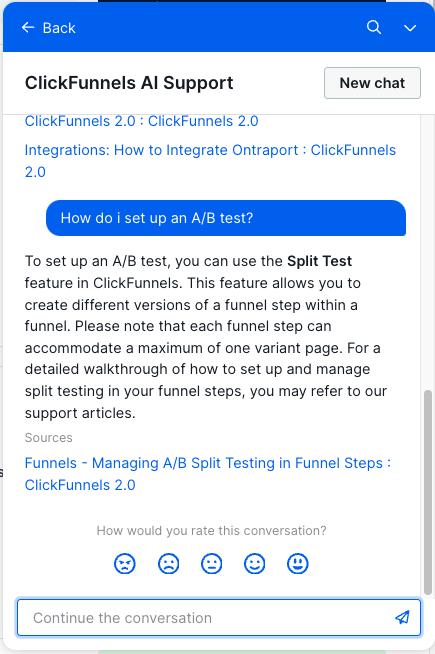
ClickFunnels support AI chatbot
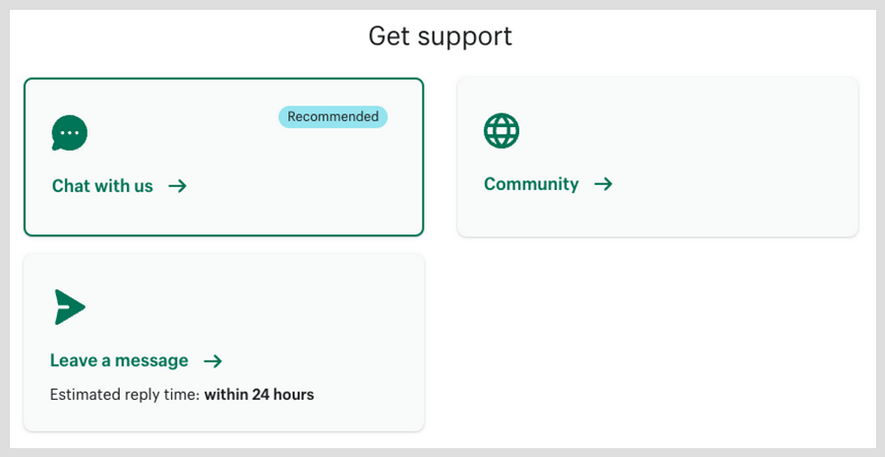
Shopify customer support options
Key Takeaway: In the ClickFunnels vs Shopify comparison, Shopify offers more comprehensive and accessible customer support with 24/7 live chat, email, and phone support, while ClickFunnels offers reliable but more limited options. Both platforms provide strong community resources, but Shopify’s customer support is often rated more highly for its availability and responsiveness.
9. Third-party Integrations
In the ClickFunnels vs Shopify debate, third-party integrations are essential for expanding the functionality of both platforms. Each ecosystem has a different focus, offering users a range of tools to enhance their business operations.
Overview of the App Ecosystems
- ClickFunnels: ClickFunnels integrates with a variety of third-party apps, particularly those centered around marketing, email automation, and CRM systems. Key integrations include tools like Mailchimp, AWeber, ActiveCampaign, and HubSpot. ClickFunnels also supports payment gateways like Stripe and PayPal, which help streamline the checkout process. While the app ecosystem is more limited, it effectively covers the tools most necessary for sales funnel optimization.
- Shopify: Shopify has a significantly larger app ecosystem, with over 6,000 apps available through the Shopify App Store. These apps range from inventory management, SEO optimization, and shipping solutions, to accounting tools and marketing platforms. Key integrations include Google Analytics, Klaviyo, Privy, and social media channels like Facebook and Instagram. This wide variety of apps allows Shopify to cater to almost any e-commerce need, making it highly adaptable for businesses at any stage.
Highlighting Key Integrations That Enhance Functionality
- ClickFunnels: Integrations like Zapier extend ClickFunnels’ capabilities, allowing businesses to connect with thousands of other apps. This is useful for automating processes like sending leads to a CRM or syncing data between platforms. The integration with Stripe makes setting up one-click upsells and downsells seamless, a crucial feature for optimizing sales funnels.
- Shopify: Shopify’s integration with apps like Klaviyo and Omnisend enables robust email marketing and segmentation, essential for growing customer engagement. Tools like ShipStation and Shippo streamline shipping logistics, and apps like Oberlo help automate dropshipping operations. These integrations make Shopify highly customizable for both small businesses and large enterprises.
Key Takeaway: When evaluating ClickFunnels vs Shopify, Shopify provides a much larger ecosystem of third-party integrations, giving businesses more flexibility to customize their stores and streamline operations. ClickFunnels focuses on a smaller set of integrations, optimized primarily for sales funnels and automation.
10. Conclusion
Choosing between ClickFunnels vs Shopify depends on the specific needs of your business, but Shopify often provides a broader, more comprehensive solution for most online sellers. Here’s a recap of the key points:
- ClickFunnels: While ClickFunnels excels at building high-converting sales funnels with tools designed for lead generation and conversion optimization, it’s primarily geared toward businesses selling digital products or services. ClickFunnels is ideal for those focused on driving customers through a streamlined funnel. However, its limited e-commerce capabilities and app ecosystem can be restrictive for businesses that require a full-scale store setup. Additionally, ClickFunnels’ pricing, starting at $97 per month, can feel costly for small businesses.
- Shopify: Shopify shines as an all-in-one e-commerce platform that’s designed for selling physical and digital products. Its powerful features for inventory management, payment processing, shipping, and integrated marketing tools make it the ideal choice for businesses looking to grow and scale. Shopify’s pricing structure is more accessible, starting at $39 per month, and its vast app ecosystem offers endless customization opportunities, allowing businesses to adapt and expand as they grow.
Final Recommendations Based on Business Needs:
- If your primary focus is sales funnel optimization for digital products or services, ClickFunnels may work well for you. However, the limited e-commerce functionality and high pricing make it less suitable for traditional online stores.
- For businesses looking to build a full e-commerce store, sell a variety of products, and grow over time, Shopify is the superior platform. Its ease of use, scalable pricing, and extensive app marketplace provide the tools needed to create a thriving online business. Shopify’s ability to support stores of all sizes makes it the more robust and versatile choice, especially for long-term growth.
Key Takeaway: While ClickFunnels is a specialized tool for sales funnels, Shopify offers a complete, scalable e-commerce solution with more flexibility and value for businesses of all sizes. Shopify stands out as the best platform for building and managing an online store.
11. FAQs
Here are some common questions about ClickFunnels vs Shopify to help clarify the differences between the platforms and guide your decision.
1. Can I use ClickFunnels and Shopify together?
Yes, many businesses use both ClickFunnels and Shopify in tandem. ClickFunnels can be used to create high-converting sales funnels, while Shopify serves as the e-commerce platform for managing the store, product listings, and customer transactions. You can integrate both platforms using third-party tools like Zapier to sync data between them.
2. Which platform is better for beginners?
For beginners, Shopify is generally easier to use. Its user-friendly interface simplifies the process of building a complete e-commerce store without requiring technical skills. ClickFunnels, while not difficult, is more focused on building sales funnels, which might require more knowledge of marketing strategies rather than just e-commerce setup.
3. Can I sell physical products with ClickFunnels?
Yes, you can sell physical products with ClickFunnels, but it is more suited for digital products or services. For businesses selling a variety of physical products or managing large inventories, Shopify is the better choice as it is designed specifically for handling e-commerce transactions, product management, and shipping logistics.
4. Which platform is better for SEO?
Shopify is the superior platform for SEO. Shopify offers a wide range of built-in tools to optimize your store for search engines, including meta tags, alt text for images, and customizable URLs. While ClickFunnels provides basic SEO features, it is not designed to drive organic traffic like Shopify.
5. Is ClickFunnels or Shopify better for building an email list?
ClickFunnels is ideal for building and managing email lists, thanks to its powerful email automation features and ability to create lead generation funnels. Shopify also allows email list building, but it primarily relies on third-party apps like Klaviyo or Mailchimp for advanced email marketing capabilities.
6. Which platform offers better customer support?
Shopify offers 24/7 support via live chat, email, and phone, along with extensive documentation and a robust community forum. ClickFunnels also offers live chat and email support, but phone support is not available, and response times may vary based on your plan.
7. Can I use ClickFunnels if I don’t have a Shopify store?
Yes, you can use ClickFunnels as a standalone tool for creating sales funnels without having a Shopify store. Many businesses that sell digital products or services exclusively use ClickFunnels without an e-commerce platform like Shopify.
8. Which platform is more scalable for growing businesses?
Shopify is more scalable for growing businesses, offering advanced plans like Shopify Plus for large-scale operations. It supports businesses as they expand with additional staff accounts, custom shipping rates, and lower transaction fees. While ClickFunnels is excellent for funnel-building, it is not designed to handle the complex needs of large e-commerce stores.
By understanding the strengths and limitations of each platform, you can better decide whether ClickFunnels vs Shopify is the right fit for your business.


